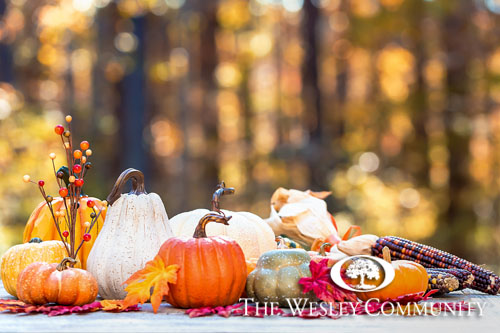If a senior in your home has dementia, Halloween can be more than a little frightening. As the holiday approaches, here’s what you should know.

Many families look forward all year to celebrating Halloween. Carving pumpkins, decorating the house and yard, finding the perfect costume, and overindulging in sweet treats all add to the festive nature of this spooky holiday. For adults with dementia, however, Halloween can be anything but fun. In fact, it can be confusing and sometimes quite frightening.
Older adults with dementia may become upset by the doorbell ringing repeatedly and masked visitors appearing in the night. Added to that is the timing of Halloween revelry: sundown. This is often the worst time of day for many seniors with dementia. Sundowner’s Syndrome causes disorientation, agitation, and even wandering.
Here are a few tips for keeping a loved one with Alzheimer’s or another form of dementia as safe as possible on Halloween and in the weeks leading up to it.
Decorating for Halloween
While going all out to create a scary scene for Halloween might be a tradition in your family or neighborhood, the site might be distressing for someone with dementia. For example, they may not understand that an animated monster or ghost isn’t real. When a loved one with dementia is living with you, a better option is to decorate with festive fall items like pumpkins, mums, and pansies. A few other safety reminders for Halloween decorating include:
- Prevent fall hazards: Decorations that block or impede commonly used pathways around the home can increase the risk of a fall. When you are decorating for Halloween, carefully consider where you place items. Avoid areas your senior loved one uses most.
- Avoid open flames: While candles can add to the drama of Halloween, they can be a hazard for an adult with dementia. Judgment is sometimes compromised as the disease progresses, so open flames are typically not a good idea. Instead, opt for battery-powered candles inside pumpkins and other decorations.
You’ll also want to make sure Halloween day itself is as safe as possible for your family member.
Keeping a Senior with Dementia Safe on Halloween
- Schedule the day carefully: Structure your loved one’s activities to happen early in the day. Keep their schedule as light as possible. This can help prevent them getting overly tired and agitated as the Halloween festivities are about to begin.
- Provide companionship during trick-or-treat hours: Make sure a friend or family member is available to sit with your senior loved one during trick-or-treat hours. Plan a few evening activities they can engage in together, such as folding towels, completing crafts, tending to plants, or listening to music. You’ll also want to create a safe space for them to hang out in, preferably in a room far away from the front door.
- Avoid doorbell ringing: Set your candy station up on the front porch or walk so ghouls and goblins aren’t forced to knock or ring the doorbell. This may help reduce some of the noise and chaos of the evening.
- Limit candy consumption: If you buy candy for your trick-or-treaters ahead of time, as most people do, limit how much your senior loved one consumes. Excess sugar can increase agitation and anxiety. This may result in your family member attempting to wander.
One final tip is to consider using an in-home caregiver to keep your senior loved one involved in productive activity while you celebrate Halloween with your children or grandchildren. You will be able to enjoy the festivities, knowing your family member is in good hands!
If you are a family caregiver for a loved one with dementia in the Saratoga Springs area, call us at 518-587-3600 to learn more. From non-medical home care to dedicated memory care, we have solutions to support you in caring for your family member.

